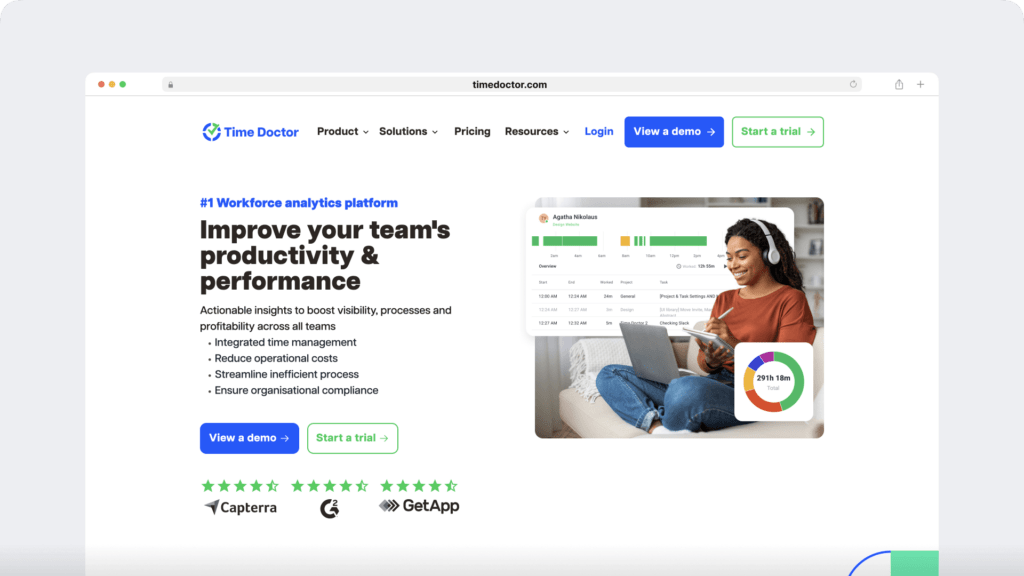Are you searching for solutions to prevent overworking employees at your organization?
It’s no secret that having overworked employees is usually an indicator of your poor organizational performance.
Unfortunately, many companies tend to overlook the problem of overworking until it’s too late and has caused employee burnout.
So how do you spot the warning signs of overworking in your organization before it’s too late?
In this article, we’ll go over everything you need to know about overworking your employees. You’ll learn what overworking is, how to spot it, and some proven strategies to tackle employee burnout in your organization.

Table of Contents
- What is overworking?
- How does overworking affect an organization?
- 6 signs of overworked employees
- 5 proven strategies to prevent overworking
What is overworking?
Before we go into the consequences of overworking your employees, you should first know what “overworking” means.
In simple terms, “to overwork” means to “exhaust oneself with excess work for long periods of time.”
Doesn’t sound too pleasant, right?
That’s because it’s not.
Overworking is often accompanied by a number of problems associated with diminished physical and mental health. But your employees aren’t the only ones who suffer.
Your company does too.
So how can overworking affect your human resources and your business?
How does overworking affect an organization?
Practicing “a culture of overworking” can result in a number of problems in your company:
1. Lowered productivity and decreased work quality
Does your staff make “expensive mistakes” at work often?
This could be things like deleting important files/folders by mistake or having frequent accidents while operating machinery.
If this is the case, chronic overwork could be the reason.
How?
An overworked employee is prone to mistakes, which lowers the quality of their work output, leading to decreased productivity. In fact, longer workweek hours (greater than 40 hours) are found to drastically affect employee productivity.
The reason?
An overworked employee is a highly fatigued individual who isn’t operating at their best capacity and is prone to making mistakes
2. Poor morale
If your employees are forced to handle heavier workloads for an extended period of time at the workplace, it’s no surprise that their morale will take a hit.
Overworking increases employee stress levels, leading to confusion, exhaustion, and poor sleep that, in turn, creates a negative attitude to work and other team members.
And remember, poor employee morale is contagious!
Additionally, unhealthy practices such micromanagement – that arise from their lowered productivity – can make this problem worse.
How?
Employees feel incompetent if you’re constantly hovering over them and supervising them closely. This leads them to feel fearful to work or communicate honestly, eventually leading them to dread work.
As a result, many employed staff tend to leave companies due to lowered morale stemming from long work hours, low wage levels, and a heavy workload.
3. Diminished company image
If your organization rewards overwork, then your employees may consider it necessary to spend longer hours at work to earn more, thus creating a “culture of overwork.”
Sure, following a culture of encouraging and rewarding overworking could result in increased turnover, pushing your employees to look for new job prospects.
But that isn’t the only problem.
This, in turn, can result in your company being viewed unfavourably – doing irreversible damage to your brand’s identity.
Whether it’s via job sites like Glassdoor, Indeed or LinkedIn, there are tons of ways for your company’s culture of overwork to become known to the public. This can attract negative press and bad reputation as an employer, deterring future candidates from applying to your company.
6 signs of overworked employees

Now that you know the causes, how can you identify the signs of overworking?
Some of most common warning signs of burnout are listed below:
1. Increased overtime and “odd” working hours
Are your employees working overtime – even across weekends, to cope with a never-ending workload?
It’s the most tell-tale sign of burnout in any organization!
If your employees feel like the daily work hours are not sufficient to complete their tasks, chances are they’re overworked across the work week.
How to spot this?
If you use a time tracking tool, go over the records to see how long an employee is working for. Compare this to the average number of work hours (per day or week) of a salaried employee to determine if they’re overworking.
2. Poor work performance
Are you encountering frequent mistakes and delays at the workplace that are affecting the productivity of your company?
Decreased work quality and poor customer feedback are signs that your employee is clearly struggling. And while their decreased performance could be due to a number of different reasons, a sudden drop is usually down to overworking.
How to spot this?
If your employees are missing work deadlines suddenly and there are more mistakes in their projects take a look at their workload. An overstuffed-work day is one the chief reasons for a sudden drop in productivity.
3. High voluntary turnover
Is your employee turnover rate in your company rising?
Overworking your employees could be the root cause.
An unreasonably high employee workload, especially when combined with poor workplace morale and a lack of vacation time, can lead to a high turnover rate.
If your talented employees are voluntarily leaving the company in search of better job offers, it’s time to step-in.
How to spot this?
A high turnover rate usually means a high volume of unhappy workers.
However, to attribute the reason for that turnover, make sure you conduct exit interviews and regular workplace culture surveys. This way, you’ll have some insights into whether burnout was the chief reason for this turnover.
4. No work-life balance
If your employees are unable to maintain their work-life balance, then it’s probably down to them putting in overtime hours.
If your employees fail to take time off for “unplugged vacation time” and family events, it strains their personal life and also leads to work-family conflicts.
They may also constantly feel like there is “less time” to complete their tasks across a work week – leading them to put in more hours over the weekend to cope.
The result?
A vicious cycle of overworking continues – constantly diminishing their work life balance.
How to spot this?
Ensure that you track the breaks, vacation time, and paid time offs (PTOs) that your employees take. If they’re seldom utilizing any of the above, it indicates overworking.
5. An inability to relax
If your staff find it hard to relax and unplug due to stress and overexhaustion, then they could be overworking.
Overworked employees tend to obsess about their work-related commitments and challenges, making it difficult to relax at their own time. This in turn, leaves no room for their personal life commitments and self-care.
Additionally factors like the Coronavirus pandemic (COVID-19) can lead to increased anxiety – making them more reactive to overtime work stress during the next workday.
How to spot this?
Look for visible signs of sleep deprivation such as irritability, fatigue,, drowsiness at work, and dark circles under eyes. You can also create health and wellness check programs to detect any underlying health problems.
6. Visible signs of poor health
According to a study, employees who work overtime regularly have an increased risk of stroke and other health disorders.
For example, if your employees are seated for longer hours, it slows down their metabolism, compromises their posture, and lowers their energy expenditure.
Overworking may also lead to a host of other health issues, including depression, heart disease, high blood pressure, rheumatic disorders, and chronic pain.
How to spot this?
Monitor health-related absenteeism and sick days among your employees. Conduct employee wellness surveys and free “workplace stress checks” regularly to keep track of how they’re doing.
5 proven strategies to prevent overworking

You now know how to spot over workers at your company.
But how do you deal with them?
Here are 6 proven strategies to prevent overworking:
1. Practice proactive leadership
As an employer, be proactive to prevent overworking employees in your organization.
Remember, if you avoid following the workplace culture of overwork yourself, it encourages employees to follow suit!
Create an environment of trust, transparency, and open communication. Being an empathetic and involved leader will encourage your staff to approach you in case they’re feeling overworked.
Additionally, by being more involved with your staff, you can easily notice signs of burnout and take the necessary steps before it gets out of hand.
2. Encourage a healthy work-life balance
Taking adequate time off from work is necessary to deal with a high stress level.
An unhealthy work life balance affects the overall well-being of your employees and also hurts your company.
To deal with this, respect your employees’ work life balance and they will automatically start respecting it themselves.
For example, encourage them to take breaks and day offs. This gives them enough mental space to lead a healthy personal life or pursue their hobbies and interests.
You can also set flexible working hours, and train your workers to set boundaries at the workplace – helping them better cope with their work.
3. Build a “Care Culture”
Does your company culture normalize overworking?
Are your good employees feeling overwhelmed with long working hours?
Are they working on holidays and after busy work seasons?
If the answer is a resounding yes, then it’s time to revamp your company’s work culture.
Building a “culture of care” reaps long-term benefits for the organization.
To start with, hold one-to-one meetings with your employees. This gives them clarity about the company goals and work expectations.
During these meetings, encourage them to give their inputs and feedback. Take notes, and let them know that you take them seriously.
The benefits?
A healthy work environment that makes them feel valued and heard.
Also take the time to conduct periodical surveys to analyze the work culture so that you can make any changes as required. To further improve employee engagement, you can always conduct workshops to reduce workplace stress.
4. Offer perks and benefits
The greater the work benefits, the happier your employees are!
Most companies with a culture of overworking offer very few perks to their overworked employees apart from monthly salaries, despite all their hard work.
Remember, a happy employee has high morale and is motivated to work.
You can boost your employees’ morale by giving them a host of special benefits and accommodations like:
- Financial reward programs such as bonuses and quarterly incentives
- Transportation allowances, paid time offs (PTOs), overtime pay, and paid parental leaves.
- Health insurance (include dental and vision insurance) and wellness programs
- In-house daycare service or parent rooms for new parents in the office
- Free access to healthy snacks and great coffee
Also, ensure that you implement healthier incentives across your organization.
Workers who fall under the category of minimum wage according to the Fair Labor Standards Act (FLSA) should not be excluded from many of the perks and benefits provided by your company.
5. Use employee productivity tools
Sure, creating the right work environment is important, but to truly prevent your employees from overworking, you need a way to actively help them.
And that’s where employee productivity tools like Time Doctor come in.
What’s Time Doctor?

Time Doctor is a popular employee productivity tool that’s used by large companies as well as SMBs. It’s got everything your employees need to stay productive and prevent themselves from overworking.
How?
- Employees can use Time Doctor to monitor the time they’re spending on tasks – ensuring that they don’t work longer hours at a stretch.
- They can also use Time Doctor to ensure that they’re spending their work time on the right sites – and not wasting it on social media and other unproductive platforms.
- Time Doctor can also help them monitor how long they’re idle for. This can give them unique insights into when they’re most productive and in the best frame of mind.
- Your employees can also check out Time Doctor’s extensive reports to understand how they’re spending their time and make any changes when necessary.
Final thoughts
The bottom line is that overworking is one of the most serious challenges for any modern workplace. Long hours and an ever increasing workload can lead top talent to becoming unproductive.
It’s one of the reasons why your company needs to be proactive about this and stamp out the problem before it’s too late.
Use the tips in this article to identify the causes of overworking and take the necessary measures to resolve it at the earliest. Once you do, you’ll create a healthy work environment that leads to happier and more productive workers!

Liam Martin is a serial entrepreneur, co-founder of Time Doctor, Staff.com, and the Running Remote Conference, and author of the Wall Street Journal bestseller, “Running Remote.” He advocates for remote work and helps businesses optimize their remote teams.


